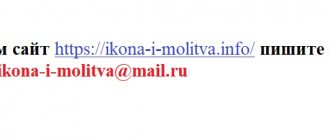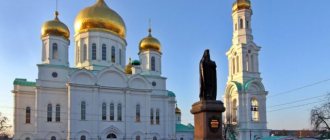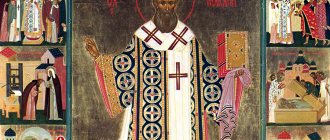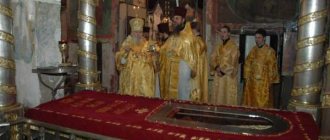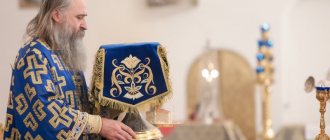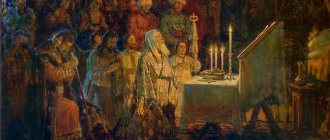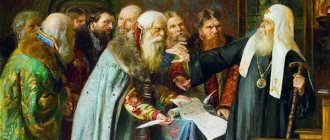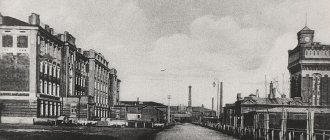| Paramon (Dove), bishop. Bronnitsky. Photo from official website of the Patriarchal Orthodox calendar for 2022 |
Paramon (Golubka)
(born 1977), Bishop of Naro-Fominsk, vicar of the Patriarch of Moscow and All Russia, manager of the Northern and Northwestern Vicariates of Moscow, rector of the Church of Equal Apostles. Konstantin and Elena in Mitino, Moscow, chairman of the burial commission at the Diocesan Council of Moscow In the world Golubka Fedor Mikhailovich, was born on June 26, 1977 in the village of Uglya, Tyachesky district, Transcarpathian region of the Ukrainian SSR, into a family of employees. He was the eighth of ten children in the family, he had two more sisters and seven brothers. Elder brother - Archimandrite Simeon (Golubka) (born 1968); sister - nun Seraphima (Dove). Baptized in infancy with the name Theodore.
In 1984-1994 he studied at Uglyansk secondary school. In the third grade, he, along with other children, was forcibly accepted as a pioneer. This outraged him so much that after the ceremony, he took off his tie in front of everyone and wiped his shoes with it. However, there were no serious consequences: the school director ordered not to do this again, otherwise they would be registered with the police.
Since school, I have been a nun in the Church of the Nativity of the Blessed Virgin Mary in the village of Uglya.
In 1994 he entered the Moscow Theological Seminary, from which he graduated in 1997. While studying at Moscow theological schools, he studied with Archimandrite Kirill (Pavlov), confessor of the Trinity-Sergius Lavra.
On December 5, 1996, ordination as a reader was performed by the rector of the Moscow Academy of Arts and Sciences, Bishop Evgeniy (Reshetnikov) of Vereisky.
In 1997 he was enrolled as a novice of the Trinity-Sergius Lavra.
In 1997 he graduated from the Moscow Theological Seminary and entered the Moscow Theological Academy.
On March 30, 1998, he was tonsured a monk and named in honor of the martyr Paramon of Bithynia [1] by the abbot of the Trinity-Sergius Lavra, Archimandrite Theognost (Guzikov).
On July 23, 1998, he was ordained as hierodeacon by Bishop Alexy (Frolov) of Orekhovo-Zuevsky in the Moscow Church of the Deposition of the Robe.
On October 14, 2000, he was ordained hieromonk in the Intercession Church of the Intercession Stauropegial Convent in Khotkovo by Patriarch Alexy II of Moscow and All Rus'.
In 2001 he graduated from the Moscow Theological Academy.
In December 2001, he was sent on a business trip to the Yuzhno-Sakhalin and Kuril diocese.
From December 31, 2001 to June 1, 2010 - abbot of the Resurrection Cathedral in the city of Yuzhno-Sakhalinsk.
In 2003, he was elevated to the rank of abbot by Bishop Daniil (Dorovskikh) of South Sakhalin and Kuril Islands.
From June 1, 2010 to April 12, 2012, he served as canonarch at the Trinity-Sergius Lavra.
On March 22, 2011, he was included in the newly formed working group under the Patriarch of Moscow and All Rus' on the transfer of shrines (since May 30 of the same year - a commission under the Patriarch of Moscow and All Rus' on the transfer of shrines).
On April 12, 2011, he was appointed full-time cleric of the Church of the Nativity of the Blessed Virgin Mary in Kapotnya, Moscow.
On November 28, 2011, he was appointed chairman of the newly formed Commission for Coordination of Exhibition Activities of the Russian Orthodox Church.
On February 24, 2012, he was appointed full-time priest of the Church of the Holy Apostles Peter and Paul in Lefortovo, Moscow.
| Hegumen Paramon (Dove) |
On July 26, 2012, he was appointed abbot of the Donskoy Stauropegial Monastery in Moscow, and on September 1 of the same year he was elevated to the rank of abbot of the Donskoy Monastery with the presentation of the abbot’s staff in the Great Cathedral of the Moscow Donskoy Monastery by Patriarch Kirill of Moscow and All Rus' [2].
On October 22, 2015, he was elected Bishop of Bronnitsky, vicar of the Moscow diocese [3].
On October 27 of the same year, he was elevated to the rank of archimandrite in the Church of the Holy Blessed Prince Alexander Nevsky of the Moscow Donskoy Monastery by Metropolitan of St. Petersburg and Ladoga Varsonuphius (Sudakov) [4].
On November 3, 2015, he was appointed manager of the Northern and Northwestern Vicariates of Moscow [5].
On November 5 of the same year he was named [6], and on December 2 he was consecrated Bishop of Bronnitsky, vicar of the Moscow diocese. The ordination in the Moscow Cathedral of Christ the Savior was led by Patriarch Kirill of Moscow and All Rus'. Concelebrating with him were: metropolitans - St. Petersburg and Ladoga Varsonofy (Sudakov), Istra Arseny (Epifanov), Arkhangelsk and Kholmogory Daniil (Dorovskikh), Barnaul and Altai Sergius (Ivannikov), Smolensk and Roslavl Isidor (Tupikin); Archbishop of Sergiev Posad Feognost (Guzikov); bishops - Gury (Shalimov), Seraphim (Zaliznitsky), Dmitrovsky Theophylact (Moiseev), Solnechnogorsk Sergius (Chashin), Jerome (Chernyshov), Orekhovo-Zuevsky Panteleimon (Shatov), Voskresensky Savva (Mikheev), Berdyansky and Primorsky Ephraim (Yarinko) , Egoryevsky Tikhon (Shevkunov), Bogorodsky Anthony (Sevryuk) [7].
In November 2015, he was appointed manager of the Northern and Northwestern Vicariates of Moscow.
On April 10, 2022, he was appointed acting rector of the Church of the Great Martyr Demetrius of Thessaloniki in Khoroshevo, Moscow [8].
On February 26, 2022, he was appointed suffragan bishop of Sergiev Posad, vicar of the Holy Trinity Sergius Lavra, with release from the vicarage of the Donskoy Monastery and an expression of gratitude for the labors incurred [9].
On February 28, 2022, he was released from the management of the Northern and Northwestern Vicariates of Moscow.
On March 12, 2022, in addition to his obedience, he was appointed manager of the Northern Vicariate of Moscow.
In July 2022, he was relieved of his post as Chairman of the Commission for Coordination of Exhibition Activities of the Russian Orthodox Church.
On August 25, 2022, he was relieved of his post as vicar of the Holy Trinity Sergius Lavra while retaining his duties as vicar of His Holiness the Patriarch of Moscow and All Rus' with the title “Naro-Fominsk”; appointed chairman of the Financial and Economic Administration of the Moscow Patriarchate.
In 2020-2021, he is an ex-officio member of the Supreme Church Council.
On September 3, 2022, he was appointed manager of the North-Western Vicariate, while maintaining management of the Northern Vicariate of Moscow. Also, by Patriarchal decree of September 3, in addition to the obediences carried out, he was appointed rector of the Church of the Life-Giving Trinity in Khoroshevo, Moscow. From September 17 to November 25, in addition to the obediences he performed, he served as rector of the church. Vlasiya (Savior of the Transfiguration) in Staraya Konyushennaya Sloboda in Moscow.
On April 13, 2022, he was relieved of his post as Chairman of the Financial and Economic Administration of the Moscow Patriarchate.
On April 15, 2022, he was relieved of his post as rector of the Church of the Life-Giving Trinity in Khoroshevo and appointed rector of the Church of the Equal Apostles. Konstantin and Elena in Mitino, Moscow.
Hegumen Paramon (Dove): After the persecution experienced, one cannot rush to return to ancient practice
Discussion continues on the draft “Regulations on Monasteries and Monastics,” developed by the Inter-Council Presence. The rector of the Vatopedi Monastery on Mount Athos, Archimandrite Ephraim, believes that it is more correct when the abbot is chosen by the brethren, and not appointed from above. In an interview with Pravmir, the abbot of the Donskoy Monastery, Abbot Paramon (Golubka), expressed his opinion about the project.
Hegumen Paramon (Dove)
— Father Paramon, do you agree with the proposal of the authors of the project or do you think that it is more correct when the abbot is chosen by the brethren
— Answering your question, I consider it necessary, first of all, to note that in the Church content always prevails over form. This circumstance takes on special significance in the context of the discussion of the draft document “Regulations on monasteries and monastics.”
The history of monasticism in the Byzantine Empire clearly demonstrates that the election of an abbot from among the brethren was a traditional form of succession of spiritual power in the monastery. However, before applying this paradigm to modern monasteries, it is necessary to recall a number of circumstances related both to the various vicissitudes that took place in the history of the Russian Church of the 20th century, and to the way of life of Russian monasticism at the present time. Simply put, it seems to me that today, after the persecution the Church has experienced, we cannot rush to return to the ancient practice of electing an abbot by the brethren.
A return to this practice is possible, but for this the monastics themselves must mature. Let us remember what criteria the ancient monks were guided by when choosing an abbot over the brethren? They were by no means choosing someone who would encourage the shortcomings of the brethren, thereby turning the monastery into a Cossack freemen.
A monastery is a religious school with a very clearly defined statutory life: everyday life, cell rule, joint worship and obedience. The one who was most successful in monastic life was elected abbot; the one who with his life could set an example of following the communal rules was elected, thereby not giving others a reason to weaken their saving feat.
In our time, monasticism in Russia is only on the path of its revival. People come to monasteries, most of whom know little about monastic life. It seems to me that in such conditions it is very premature to proceed to the election of an abbot by the brethren. It is necessary that the brethren in monasteries become spiritually stronger, mature enough to choose not the most “convenient”, but the most worthy.
Today, the discussion of the Regulations in many commentaries comes down to proposals for various variations of the relationship between the administrative power of the abbot and the diocesan bishop in a particular monastery. At the same time, the question of the spiritual authority of the head of the monastic community falls out of sight of the participants in the discussion, although if this issue is resolved positively, it seems to me that the problem of administrative prerogatives will fade into the background.
However, even today diocesan bishops, when appointing a new abbot or vicar to a monastery, listen to the opinion of the monks and take an interest in the internal life of the monastery. Thus, the random selection of one candidate or another is excluded.
During the pilgrimage to Athos, I was lucky enough to communicate with Archimandrite Ephraim, who made a very deep impression on me. Undoubtedly, his advice is of particular value to us, but it must be taken into account that Athos did not survive the upheavals that befell Russia at the beginning of the 20th century. I repeat: the election of the abbot of a monastery by the brethren is an ideal option, but its implementation often depends not only on the internal environment of the monastery, but, no matter how strange it may seem, also on the conditions of the socio-political life of the state.
— Archimandrite Ephraim not only himself combines the duties of abbot and confessor, but writes that this is how it should be, and the practice that has developed in Russia of dividing these responsibilities is possible only in exceptional circumstances.
— Father Ephraim is a man with real spiritual authority. The election of an abbot by the brethren presupposes the presence of such authority. It is quite natural that the abbot becomes at the same time the confessor of the monastery. In Russia now there is a slightly different practice - an abbot is appointed. It is impossible to appoint a confessor - this would be a violation of the principle of spiritual freedom, which could lead to various disorders.
Of course, even today the abbot of a monastery can simultaneously be the confessor of the brethren, but only if the brethren themselves recognize him as having sufficient experience and authority.
Officially, the confessor is also appointed by the clergy (in our Donskoy Monastery - by the Holy Patriarch), but this issue is first decided at the spiritual council of the monastery, which includes not only monks holding administrative positions, but also those who enjoy the greatest spiritual authority among the brethren.
It is the spiritual council of the monastery that proposes the candidacy of a confessor for the monastery, petitioning for the approval of this brother as a spiritual father and mentor.
On the other hand, the separation of the functions of confessor and abbot of the monastery, observed in modern monasteries of the Russian Church, also has its positive aspects. So, for example, the confessor of a monastery is not burdened with administrative obedience, thanks to which he has more free time for the spiritual care of the brethren.
— Father Ephraim’s greatest objection was caused by the point about the inadmissibility of monks serving in nunneries. Do you agree with him that only a monk can spiritually instruct monastics, and that women's communities were successful when they were under the spiritual guidance of experienced elder hieromonks?
— If you carefully read Father Ephraim’s commentary, it is easy to notice that the main concept with which Father Archimandrite operates is “experience.” It is the presence of spiritual experience that allows a priest to become a true spiritual mentor for each resident of the monastery.
The Shamordino monastery, for example, was cared for by the Monk Ambrose of Optina, and the Diveyevo monastery by the Monk Seraphim of Sarov. Why? I think the question was not what the marital status of these ascetics of piety was, but what kind of experience they had in dealing with passions.
In the nineties, we often sent young hieromonks to serve in convents. A paradoxical situation arose: a person himself takes the first steps on the monastic path, has practically no experience, and he is sent to a nunnery to edify others about the difficulties of spiritual achievement.
To avoid such confusion in the future is the purpose for which the rule on the inadmissibility of serving monks in nunneries is written. In the same paragraph there is a significant addition: “Exceptions can be made only for pastors who have rich spiritual experience and are in advanced years.” Thus, our hierarchy indicates that an experienced elder monk can minister to a nunnery.
“But there are probably fewer such elders than there are women’s monasteries.” So, in most of them the confessors will be archpriests?
- Yes, and I don’t see any tragedy in this. How does the Christian life of a monk differ from the Christian life of a married person? Everyone is overcome by the same passions.
I agree with Father Ephraim that it is very good if the female monastic community is cared for by an experienced elder monk. But I would not categorically assert that a person without monastic experience cannot edify monastics. Everything depends on the inner world of a person. You can live in a monastery as in the world, and in the world as in a monastery. The kind of life a priest leads determines whether the convent he cares for will succeed in spiritual life.
The current tradition of sharply opposing monastics to the so-called white clergy seems to me to be incorrect and has nothing to do with the spirit of Christianity. Often, in the course of such reasoning, it turns out that in the minds of individual parishioners, the spiritual experience of the white clergy turns out to be deficient in comparison with the experience of monastics. However, to debunk this myth, you don’t have to go far - let’s remember the righteous John of Kronstadt, Alexei Mechev and other wonderful shepherds of the Church of Christ.
We are all Christians, members of one Church, and we partake of the same Chalice. From my point of view, such a contrast is false, far-fetched, and most importantly, a contrast that misleads Christians. We are all called to salvation: everyone must choose the place of their salvation - a monastery or the world - in accordance with their inner structure.
— The draft states that experienced monks, with the blessing of the abbot, can become mentors for lay people visiting the monastery. Does this mean that other monks will not confess at all?
— A person, coming to a monastery, remains in obedience to the abbot or dean of the monastery. It is the monastic hierarchy that determines who can accept confession and who cannot. At the Trinity-Sergius Lavra, the newly ordained hieromonk never performed the sacrament of confession.
In pre-revolutionary Russia, this rule applied not only to monastics; confession was performed only by experienced clergy. In Russia today there are not enough priests, so there is no way to return to this practice overnight. But in monasteries, I hope, this rule will soon become the norm - only experienced monks will confess to the laity.
— I didn’t communicate much with the monks, but reading the letters of Father John (Krestyankin), the sermons of Metropolitan Anthony of Sourozh, I was always amazed at how deeply they understood the problems of the laity, including family ones. But can every monk, even an experienced one, if he came to the monastery in his youth, give correct advice on issues of family life?
“It’s not surprising that such an experienced old man as Father John (Krestyankin) could see the cause of some family troubles and help cope with them. After all, at the heart of family troubles lie the same human passions with which monks struggle. The main thing is that the doctor - the shepherd - correctly makes the “diagnosis”, and it does not matter whether he himself has a family.
It is important to remember that no one person can understand all the details of complex everyday situations. And it is difficult for me to answer questions about family life. In this case, I honestly tell the person who comes to me that I do not have enough experience, and I advise him to contact a married priest.
There is no sin in admitting to a parishioner your lack of competence on a particular issue. It’s a sin to do the opposite. For any priest, monastic or married, the main thing is to help everyone who comes to him for advice and support. Help, not harm.
— You served in parishes for many years. As far as I understand, the tradition of monks serving in parishes developed during Soviet times, when there were almost no functioning monasteries left? The draft says that constant service in the world is not useful for a monk. What about the impermanent?
— It is generally not useful for a monk to go beyond the walls of the monastery. Believe me, any monk who has lived for some time in a good monastery always dreams of one thing - to return back to his native monastery.
Perhaps the tradition of monks serving in parishes actually developed during the years of persecution, when there were not enough monasteries or clergy. But even today, bishops are often forced to appoint monks to parishes. In most cases, we are talking about those parishes where a married person cannot live.
— Today, many monasteries are active in social activities, in which lay people also participate, and work with young people. Some Orthodox Christians, while supporting such initiatives in parishes, doubt their appropriateness in monasteries. Do you think social activity interferes with a monk?
- A good deed, be it helping the sick, the needy, the homeless, educational activities, does not violate the monastic routine. You just need to remember that you are doing this out of obedience, not forgetting about the main feat for every monk - fasting and prayer.
— What is the right thing for a monk to do with gifts? We are, of course, not talking about cups, but about cars and telephones. It is clear that in the current conditions, some monks have to travel a lot out of obedience, and they need a car. But people, seeing a priest in an expensive foreign car, are tempted. If it was given to a monk, can he sell it, buy a simpler one, and donate the proceeds to the monastery or to those in need? Wouldn't that be a violation of the vows?
- There will be no violation in this. I don’t understand how you can demand from a person who, due to circumstances beyond his control, spends a considerable part of his time in a car, that he sell the car he received as a gift and switch to a lower-quality vehicle. Let me ask myself a question: why do those people who today actively criticize the Church on this issue themselves prefer to use very expensive cars?
In order to be perfect, a person must renounce everything, including his own will - every Christian is called to this. Let me emphasize: this rule applies not only to monastics, but also to every Christian in particular. Attachment to things is sinful for both the monk and the layman.
A monk should not become attached to things given to him. If he is free from such attachment, then no car will harm his soul. The main thing is that the thing does not possess the person.
Recently I once again re-read the life of St. Macarius of Egypt. Three times thieves came to his cave in which he lived. Entering the cave and seeing that they were stealing from him, he helped the criminals collect the things that were there and take them out. This is the principle of spiritual freedom: you can lose everything at any time and you will not grieve about it.
Please note: even the basic necessities of life can so capture the mind and heart of a person that he becomes a slave to them.
Interviewed by Leonid Vinogradov
lanfren-lanfra
From an invaluable source of information on internal church affairs, kalakazo found a lot of interesting things about the beloved of Kuraev’s friend, Arkhangelsk Bishop Danila (for whose sake the protodeacon today bravely smeared the late Bishop Tikhon from head to toe with feces).
The information is not new - summer 2012. (in the second photo - nun Seraphima (Dove) in person; in the third - the bishop's couple: Danila is driving, Seraphima is nearby) “Unfortunately, this is not the exception, but the rule in the Arkhangelsk Metropolis, where an atmosphere of fear, mistrust, cruelty and lawlessness has reigned . The clergy whisper about this, and many parishioners speak out loud, but secular people simply laugh! Here is a picture of a bishop's service in a church in Arkhangelsk. A black jeep driven by Mother Seraphim drives up to the temple to the sound of bells. They enter the church together, the Metropolitan dresses at the entrance, and she walks through the clergy to the iconostasis, to the choir, where a chair is ready for her. She intervenes in singing throughout the service (choirs are Mother Seraphim’s specialty; she has already dispersed several in Arkhangelsk). It is impossible to watch how the priests are forced to grovel before her, how at meals toasts begin with the words: “Dear Vladyka, dear mother...”... On the second floor there are the metropolitan’s chambers and next to it are the chambers of the mother, who, without being embarrassed by strangers, walks around the diocese in a robe and shows his influence by interrupting the Lord, raising his voice at him, swearing at him. One can imagine how she communicates with the clergy and ordinary laity!.. Your Holiness! We don't understand what's happening. How does this young woman rule the entire metropolis and turn the metropolitan around as she wants? Does the Church Charter really give the treasurer such exclusive powers in the absence of control?” “The austerity regime is being established by the “right hand” of Metropolitan Daniel, nun Seraphim, who arrived with him and is listed as the treasurer of the diocese. However, the scope of her powers is much wider... And she had to hear reproaches that she speaks with priests in an authoritative tone from all sides - in the city the eloquent nickname Mother Fukushima (or Kherashima) was assigned to her. I myself witnessed how she, standing before the service on the choir of the Elias Cathedral and sorting out the notes, busily gave orders to the priests of the temple.
By the way, the brother of the Lady Seraphima Golubka, Paramon Golubka, jumped today, for no apparent reason, being an ordinary priest, immediately to become the vicar of the Moscow Donskoy Monastery: it’s not otherwise than another family contract that Russian Orthodoxy is embellished with:
An Arkhangelsk blogger tells the details - exactly from what fright our well-fed homo-rattler decided to shit on the grave of Bishop Tikhon (Stepanov): ...The backstory of this disgusting Kuraevsky post is wonderful, how he ended up in the Arkhangelsk diocesan administration. He was hired by Metropolitan Daniel for money to come and bark at the “Kochetkovites.” He coped with his mission and even surpassed it, shouting from behind the backs of the Cossacks guarding him from the people, nasty things (of a completely different kind for some reason) about Bishop Tikhon. And now, I’m sure, he himself or Metropolitan Daniel realized that under the guise of fighting the “blue lobby” one can make money, and the other... Here you need to understand that the love that a huge number of ordinary people still feel for the late Bishop Tikhon, their the fact of the presence of the Arkhangelsk diocese in the air “kills” Daniel. Because love destroys evil at all times. And Metropolitan Daniel needs to get rid of this love at any cost. The memory of him will be covered with mud. Any vile accusations. Daniil is ready to spend any money on this. And I don’t really believe in the holy war of Deacon Kuraev itself. Another bee against honey. I think that in this whole big story he is just a lap dog of the “Shevkunov” clan in the fight against the notorious “blue lobby”. And in the course of this whole story, it is not the Church that is being cleansed, but new intrigues are being woven, cash flows and profitable dioceses are being redistributed. One shame comes to replace another, some scoundrels replace others.
Let me just make one clarifying comment. In the clan, in the interests of which the protodeacon practices shit-throwing, there are almost more homosexuals in robes than in the notorious “blue lobby” (one Mercury-Venus, with whom the protodeacon rubs shoulders, for what it’s worth!). This is all purely PR jokes. The example of the late Tikhon shows that they can classify anyone as a “faggot.” And vice versa, their standard heterosexual bishops are scum worse than homosexual ones. Don't look for pearls in this garbage heap! Don't be roosters!
Lord Paramon talked about how he was the eighth child in the family
Lord Paramon told a lot about himself. He said that he was the eighth child in the family: he had 2 sisters and 7 brothers. Since his school days, he was a sexton in the rural church of the Nativity of the Blessed Virgin Mary.
On Sunday, his family went to church for a service. He also said that he studied in a regular school, and very often he had problems because of his faith. In the 3rd grade, he, along with other children, was forcibly accepted into the pioneers, as they said, “whether you like it or not, wear a tie.” He was very outraged by this, and after the ceremony he took off his tie and wiped his shoes with it, but then he got off lightly, the school director ordered him not to do this again, otherwise he would register him with the police.
Since childhood, Lord Paramon served as a sexton in the temple Photo: moseparh.ru
He talked about how Orthodoxy was not advertised in schools back then. Among the teachers and directors there were those people who pretended to be atheists. At the same time, when the attitude towards the church changed, the bishop said that many teachers began to openly go to church. Often, over the course of many years, he met a primary school teacher at liturgy in his native village. This meeting was quite joyful.
